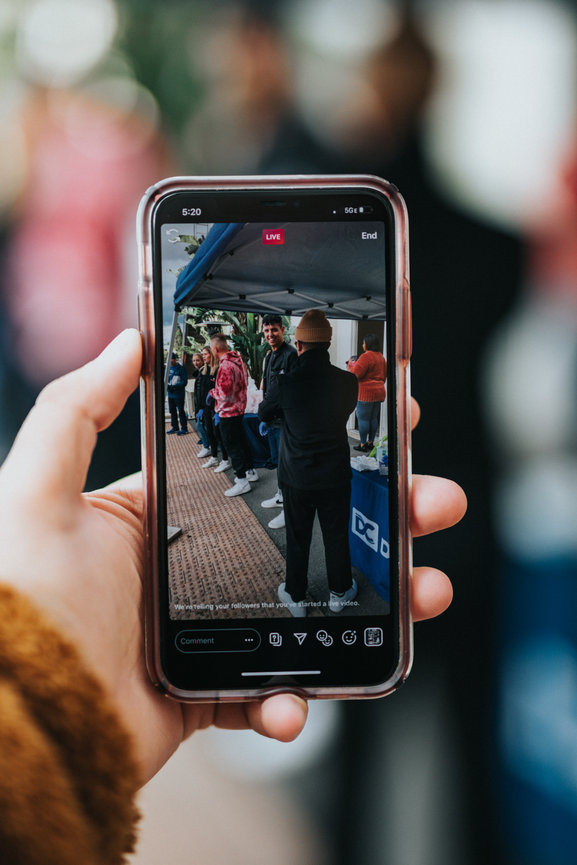Social media is ever-changing. Something you were doing 5 or even 2 years ago might not have the same results as before. Platform algorithms are continuing to change in response to competitors and the evolving state of social media.
For instance, do you remember when Instagram was a platform for photos? I jest, but it’s no longer the sole focus of the platform. Sure you can post pictures, but you have to do a lot more to keep your engagement up.
Meta is leading a lot of these changes. Both Facebook and Instagram are two of the most popular platforms when it comes to selling online, but simply having a business page and an account isn’t enough anymore. You have to have a strategy.
Social media will keep changing and we will all have to continue to adapt, but for now here are some things to consider for your Facebook and Instagram strategies.
Facebook Live videos have a huge reach
Live streaming has increased in the last few years but never so much growth as in the last two years. And it is expected to continue to grow. According to Cisco, live video growth was expected to grow 15 fold by 2022 and reach 17% of all internet traffic. People have pivoted to live streaming not just for educational purposes but also as a way to interact with customers and sell.
We also host a series of education events on Facebook Live. We do this in part because of how much greater the reach is compared to just a post.
Selling via live video through your social media channels can feel a bit like a QVC deal or infomercial; you can show off a product, discuss its features and the value you can bring to someone, and even let people ask questions and interact with you. The live interaction also gives the product a realness factor, which consumers crave these days. We are living in an influencer economy in which people trust recommendations about products from people they know (either in real life or through online interactions).
Let’s walk through a few examples. If you are a florist and had an event go really well, you could invite the hosts of the event to film a live video with you to show off what you did that day and have them talk about their experience and what value your services added to their special day.
If you sell products such as art that gets displayed in people's homes, you could create a video to show off what the art could look like in your client’s home so people can imagine the possibilities for themselves.
If you do education and events, you could create videos to give tours of your space, talk about a product you like, what industry events you plan on attending this year, and much more.
Each of these examples can help create engagement with your customers, target audiences, and colleagues.
Tips for live streaming:
-
Keep it conversational
Long-form, conversational videos work well. Keep it fun and engaging for people watching to chat with you. If you are doing something educational, make sure to use visuals to help stimulate conversation or the ability for people to chat back.
-
Show what your doing, ask for feedback, or show value to customers
Visuals help engage viewers. This can include on-screen prompts like polls and asking for written feedback from your viewers to encourage them participate.
-
Schedule out your events
Tell people in advance so they know when to join! -
Keep it consistent
If you plan on offering video content on a regular basis, consider scheduling a consistent time such as once a week (same day, same time each week). It has worked for television programming for years, and it should work for you, too!

Tip: Over 51% of consumers responded to a survey saying they were more like to engage with brands that use emojis.
Take advantage of Instagram’s pivot to video
Remember when Instagram was the biggest image-sharing app? It’s funny to say but it’s true, Instagram has changed its focus and is trending toward an ecommerce focused platform with video and influencers at its core.
Wait, images don’t work on Instagram anymore? They do, but Instagram has way more tools for you to use, instead of just image posts. We’re talking about features like Reels and Stories.
Reels is Instagram’s video option and they really want you to be into Reels, both making them and sharing them. Their algorithm prioritizes this segment of the app based on shares, reach, and time spent looking at them, which is way more than a single post. You might like an image and swipe to the next in a second, but with Reels they want you to be watching, repeating, and then engaging with them.
What if video isn’t your thing? That’s ok! You don’t need to know how to shoot video. In fact for Reels, real, organic, and raw videos grab users' attention more than something super slick.
So how do you make a video feel real? Use the tools in the Instagram app. They are there to help you quickly create Reels.
Tips for creating Reels that engage with customers:
-
Capture behind-the-scenes footage of you at work, or a product or service.
-
Showcase how your product or service solves problems for customers.
-
Highlight before and afters, they are always effective.
-
Look at the latest trends on Reels to participate with the community to get exposure.
That last tip could be the most important one. Trends on Reels typically highlight what other people are watching, and reflect when something is popular. Keep an eye on trends to see what is happening there and consider how you could pick up engagement, new followers, and possibly even new clients. Sure not every trending video will make sense for you or your brand, but it gives you insight into what people are finding interesting, and can offer inspiration.

Instagram Stories are still hugely popular
While Instagram has pivoted focus to video, you shouldn’t rely only on video on Instagram. You can still post pictures and Stories are still going strong. Stories are a great way to have your content seen by active users and your followers. What I love about Stories is how it takes seconds to communicate something to someone that they might have missed in the main feed. You can tag people, use hashtags, include video, take polls, and much more. They can be interactive to encourage people to participate, and that has potential to increase interest in your business and keep people engaged.
Another great thing about Stories is the cross post feature. You can share Stories from Instagram to your Facebook page so that even more people are able to see your content and interact with it, particularly if they are not Instagram users. Cross-posting is a great way to expand your reach.
Tips for using Stories:
-
Create polls for interaction.
-
Use the music tool for engagement, try to use trending songs.
-
Tag people.
-
Share trending content.
-
Cross-post to Facebook for higher engagement.
-
Tell a story (hopefully this part is obvious).
Many of these strategies also work on other platforms like TikTok and LinkedIn. The big component here is video. It is continuing to grow more useful for ecommerce, engagement, and interaction. It can be short, long, or live, but its value is the same. People like to watch videos. It can be an effective tool for selling an item, service, or an idea, you just have to be willing to participate.
Key takeaways:
-
Video is increasingly gaining more and more popularity on all social media platforms.
-
Use the native tools on each platform for video content creation.
-
Interaction is as important as engagement.
-
Short videos are popular, unless they are live.
Interested in using video for your marketing? Check out this article. It will help you understand how to strategically take on video and tools you can take advantage of!
Social media can be a challenge for many business owners, but if you really are trying to take advantage of all the tools online, knowing the changes can help you rise above the challenges and might even lead to customers, which is the whole intended goal.
Need help driving customers to your site? Reach out to our support team by calling us at 844.353.3412 or visiting zibster.com to chat with us (current customers, please log in first). We’d love to help!






Leave a comment
0 Comments